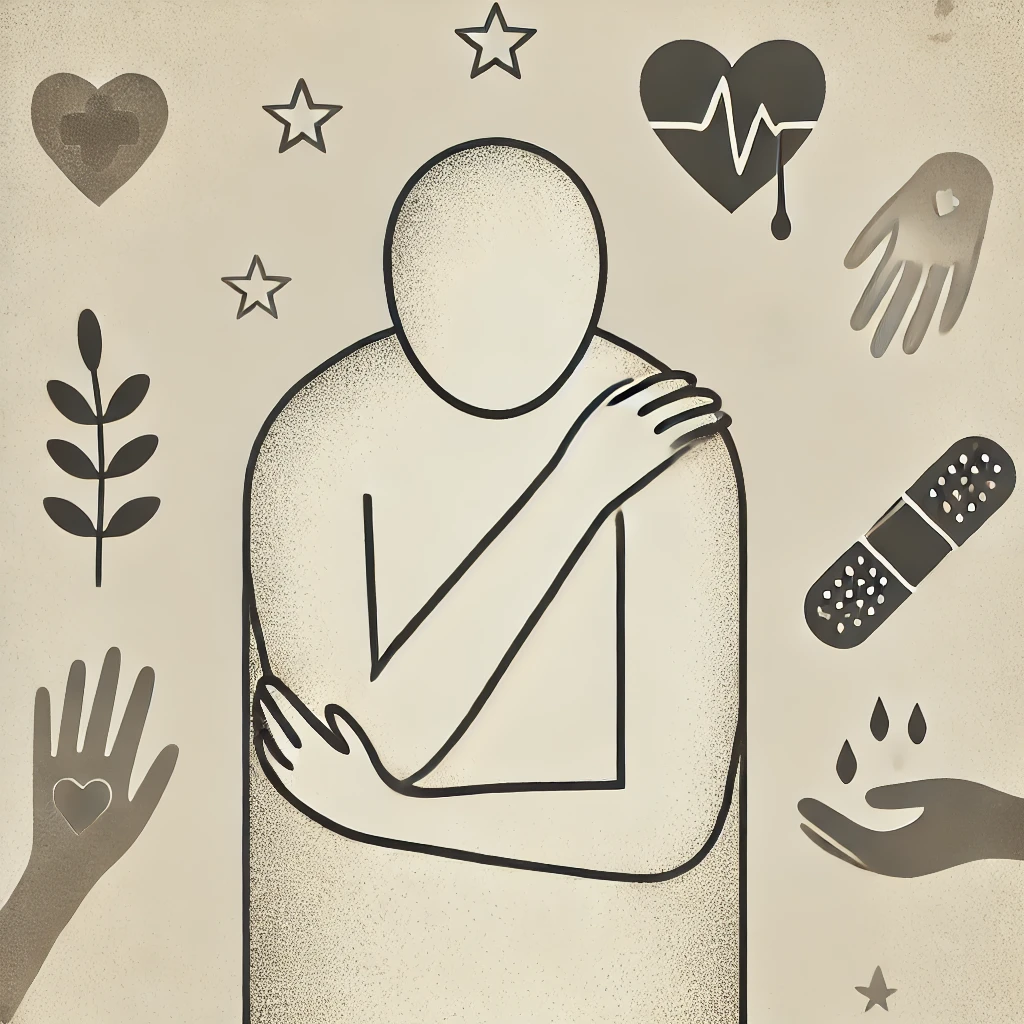Today, I will be delving into Compassion Fatigue, and how it affects those with responsibilities for others and the self-neglect and further mental health struggles this could lead to.
I am a mother of a young child who has recently started school and although I was fortunate enough to be able to send him to day care, I still had the constant emotional toll and worry of his wellbeing, as well as of course the out-of-hours care.
Despite my son being in childcare, I severely neglected my own self whilst prioritising his, something that is very normal and ‘expected’ from caregivers, especially females in ‘mothering’ positions. Whilst he was pristine in new clothes every day, hair brushed and (as it was long then) put up sweetly in a colour coordinated bobble. Meanwhile, I wouldn’t brush my hair or change my clothes, never leaving the house but waving him off to his social life, something that again, I had prevented myself from having unintentionally, whilst dealing with my mental health struggles.
This is something I will be admitting for the first time, but I have recently had to cut off all my hair because it got so matted during my mental health crisis, that I was unable to untangle it. I now have to wear wigs to be able to go out in public or answer my own door, to do the school run. Nobody noticed and even when disclosing this to mental health professionals, my main worry was how this would then portray onto their imagery of how I care for my son, it was never about myself or the care I deserved. I purely wanted to make sure they knew that although not functioning as a human, I was functioning as a mother somehow, and that my son was always protected as much as possible from the reality of what my mental health struggles were doing to me.
This is the reality for a lot of caregivers, and the feeling that they have to be present as a caregiver usually overtakes their self-compassion skills, leaving the caregiver further burnt-out, facing feelings of guilt and shame, further contributing to isolation and social withdrawal.

Caregiving in all aspects may it be for a child, for someone with mental or physical difficulties can take its toll emotionally as well as physically for anyone even if this is in a professional setting, not just social; however for those with pre-existing mental health conditions, this may lead to further emotional turmoil and burnout due to trauma stacking. Having the responsibility of others, feeling that your main reason of existence is to care for someone else, is a difficult journey to be on for anybody as we are always told to prioritise ourselves, but often lack the emotional or physical ability to do so after spending the majority of our time focusing on intense care for others. May this be by remembering and adhering to medication schedules, feeding and clothing, education and career developments, emotional and physical development as well as ethic and social training, it’s easy to see how doing this full time for someone else can leave little room for this to be self-implemented.
Caregiving can bring up unresolved trauma and further intensify the trauma for the caregiver themselves. With myself, the constant fear of the same events occurring for my son are significant triggers for myself. I feel as if I am the sole responsible for protecting him from these possibilities, despite having such a wonderful and equally attentive partner and caregiver for my son, I can further understand this when looking at the hypervigilance and tabile effect on the trauma tree example. Those caring for those with disabilities or chronic conditions can also be further triggered emotionally with visual representations of their past traumas, or by experiencing new traumas due to many aspects caused again by trauma stacking and the trauma tree, further complexifying their mental health states.
The Signs of Compassion Fatigue
To be able to recognise the signs and symptoms in ourselves and others, there are a few key points that can indicate compassion fatigue such as withdrawal and detachment, hypervigilance and promiscuity – which may arise as an attempt to cope or escape from overwhelming emotions, irritability caused by these and an emotional numbness or feelings of being ‘burnt out’ despite there being seemingly no reason for them to be so.
It’s important to note that compassion fatigue differs greatly from classical burnout, as burnout is usually associated with work-related stress and challenges due to increased pressure and high demands with lack of support and is usually characterised by emotional exhaustion and self doubt and can occur in anyone regardless of their caregiving role and is a gradual build-up following persistent stress; whereas compassion fatigue is specific for those who have caregiving responsibilities, may it be in a professional or personal setting. It results from the cumulative emotional toll of empathy and the constant feeling of responsibility for someone else’s well-being. Compassion fatigue can set in more suddenly than burnout, often as a response to specific traumatic events or a long-term exposure to emotional or physical suffering, meaning that even if the caregiving role is not specifically trauma inducing, for those who already have existent traumas and mental health conditions, they can suffer greatly from compassion fatigue for reasons ranging from guilt and shame, hypervigilance, constantly anxious and fearful states just to name a few.
Many caregivers may suffer with feelings of inadequacy due to their past traumatic experiences, and I always feel ‘undeserving’ of my sons love and always worry about my ability to care for him, although he has always had a heart full of love, has always had constant reassurance, his education and social life, his fun, his friendships have never been sacrificed, he has always had 3 warm healthy meals a day and a comfy bed to sleep in with clean clothes and a smile on his face. There is no reason for me to doubt my caregiving abilities, not professionally or personally, but it is an ‘every second’ reminder that I have to fight with, that I am not worthy. I feel that brushing his hair means I cannot brush mine, that dressing him well means I don’t need to do the same for myself too, I have done my share of ‘caring for the day’ and that I am not deserving of the same care.
The Physical Effect of Compassion Fatigue
In addition to, and usually in relation to the mental health difficulties that compassion fatigue can cause, there are the physical effects that also require their own attention such as chronic fatigue regardless of how much one seems to rest as sleep disruptions ranging from difficulties in falling or staying asleep, again due to hypervigilance can also play a vital part in ones health following compassion fatigue. The vicious cycle continues here as poor sleep hygiene can further lead to anxiety and depressive episodes increasing. All of these can then tie in to a weakened immune system, meaning the caregiver is more susceptible to illness’ including those that are psychosomative (relating to the interaction of mind and body) such as tension headaches and pains in the neck, shoulder and back
How to Cope with Compassion Fatigue
One of the most important steps in tackling compassion fatigue can be boundary setting. Although it is not always possible to walk away from your caregiving responsibilities, knowing when to request additional help and paying attention to the warning signs in ones self, as well as working on self-discipline to provide self-care can be beneficial.
I find keeping a task list of things that I want to get done the next day can be very helpful for myself, and I categorise them based on their difficulty level. For example, I will put something as basic as brushing my hair (or what is left of it) on there, or a grounding technique such as paced breathing as a low difficulty task, as they will take less than 1 minute to complete. Other things such as ‘stepping outside just once’ and ‘doing something nice for yourself’ are usually mid to high difficulty tasks and can have even a wider range, depending on the days. I reward myself, or set myself limitations on what I can and can’t do prior to these, such as making sure my hair is brushed prior to having my morning coffee or by donating to charity following a victory but these can be altered to suit personal requirements.
It’s also important to note that it’s vital to be kind to ones self during self-care and that that is the foundation that everything else will grow on; so there are days where that coffee will be made without hair being brushed and that’s okay from time to time, as long as the warning signs are noticed and a safety/care plan is adhered to to prevent a battle of negativity.
Therapy and support groups can provide immense support by not only validating the feelings, but also providing coping techniques, assisting with healthy boundary setting and safety/care plans as mentioned above.
Arguably the most effective way to manage compassion fatigue is self-acceptance, but it would be unfair to simply state this without recognising the work that it requires, something that effective communication, self-awareness and external support can provide.
The care we provide can only be what we internally know, what we feel, so whilst providing immaculate care to others, leaving ourselves without basic care is something that can be changed. We have the abilities, we simply need to remember our self worth and incorporate our care techniques to ourselves. It’s important to know that this is a life-long process but can become habitual and that the help is there for us to also help ourselves. There is no shame in requiring the care we provide for others.
